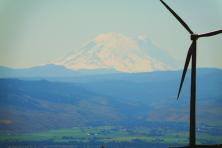The Koch brothers, and their climate-denier allies, have launched a deceptive attack on clean fuels progress in Washington State. What are they afraid of—apart from consumer choice at the gas pump?
A clean fuels standard gives transportation choices back to the people of Washington, meaning we would no longer beholden to Big Oil to power our vehicles. That's why the oil companies—and the Koch brothers—are so upset about it.
Washingtonians are proud of our state's clean air, and we are showing that a healthy climate and a strong state economy can go hand in hand. When it comes to the fuels that create our energy and help us get around, we want real, affordable choices that don't create more pollution. Our state needs more clean energy to move away from a reliance on fossil fuels, energy generated right here in the Northwest, and it's why many community leaders, businesses and elected officials have joined together to support a clean fuels standard.
Investing in healthy fuels means investments and job creation in every corner of the state. The clean fuel alternatives to dirty oil can be homegrown. Washington is blessed with cheap, pollution-free electricity and renewable natural gas from dairies and municipal waste facilities, and our foresters and farmers are ready and able to produce sustainable biofuels. Grays Harbor is home to the largest sustainable biodiesel refinery in the country, and the facility is employing more people now than ever. Agriculture businesses like Pacific Coast Canola in Warden, WA, are excited about biofuels and calling a clean fuels standard “a pro-growth initiative that is good for farmers, good for businesses, good for the economy, and good for the health of communities across the state.”
Not everyone agrees that investing in clean fuels is a good idea—but it's important to take a look at who opposes it and why. For example, if you want expert opinion about protecting clean air, your first phone call probably wouldn't be to an oil company. They're biased—and for decades they’ve been wrong about every clean air law and supposed business impacts that have not been true. Now, an oil industry-funded lobbying group is continuing to push inaccurate information by presenting some highly dubious claims about Washington's proposed clean fuels standard and claiming it as fact.
The study, released by a group calling itself the National Federation of Independent Businesses (NFIB), is a classic example of garbage in, garbage out. The authors start by misinterpreting data that was presented by consultants to the Climate Legislative and Executive Workgroup (CLEW) last October. So in their economic analysis (using the term loosely) the NFIB authors totally ignore what a clean fuels standard actually is, instead using a crude model comprising some terrible ideas they just made up. Whatever that policy is, it surely isn’t a clean fuels standard.
NFIB, the group behind the misleading report, is hardly “independent;” it receives millions of dollars from the Koch brothers, oil magnates who are also well-known opponents of clean air protections. The NFIB doesn't really speak for small businesses either. In fact, many small businesses in Washington have expressed their support for a clean fuels standard.
Transitioning off fossil fuels is all about protecting Washington State's economy from climate change impacts, and creating jobs by investing in locally-produced clean fuels. Investing in a sustainable future means that we can mitigate harmful climate impacts on our fishing industry (saving 67,000 jobs) and keep wildfires in check (saving hundreds of millions of dollars per year). Climate change is the real job killer—we can fight it by investing now in a clean energy future to cut down on carbon pollution—protecting what we have and growing the economy sustainably.
California has benefited from a clean fuels standard since 2011. Their experience stands in stark contrast to the oil company doomsday arm-waving and shoddy arithmetic. Despite having fewer in-state clean fuel resources, California uses nearly ten times more alternative fuels than Washington, on a percentage basis. A conservative analysis from ICF International found that California program was likely to increase employment, and found that growth was most robust with the strongest clean fuels standard.
Consider what Washington could be with more choices for consumers, clean fuels jobs in local economies across the state, and fewer trips to the hospital for kids with asthma with reduced air pollution. A clean fuels standard gives transportation choices back to the people of Washington.
Right now, Washington's Office of Financial Management is working with industry stakeholders and technical experts to finalize an economic report that looks in depth at how a clean fuels standard would benefit our state; those results will be out soon. In the meantime, we can safely compost the Koch brothers' debunked study—it will make fine raw material for waste-to-energy biofuels production.




